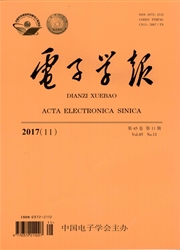

 中文摘要:
中文摘要:
大多数现有的压缩感知重构算法对脉冲噪声不具有鲁棒性,在脉冲噪声环境下,重构性能急剧下降,使得整个重构系统崩溃.针对此问题,本文提出了一种脉冲噪声环境下的稀疏重构算法BINSR算法,其基于贝叶斯理论,可以有效地估计出信号的支撑集和脉冲噪声中脉冲的位置,并且根据压缩感知观测序列的democracy特性,利用最小均方误差MMSE估计量,有效地估计出原信号.在此基础上,本文结合鲁棒统计学,提出自适应的ABINSR算法,使其不再依赖于信号以及噪声的统计参数.实验结果表明,BINSR算法在脉冲噪声环境下可以有效地恢复出稀疏信号,很大程度上改善了脉冲噪声环境下算法的重构性能.ABINSR算法不仅对脉冲噪声具有鲁棒性,而且可以在高斯白噪声环境下实现有效的信号重构.
 英文摘要:
英文摘要:
Most existing reconstruction algorithms are not robust to the impulsive noise,resulting in a sharp decline in reconstruction performance, so that the entire reconstruction system crashes. A sparse reconsTruction algorithm named BINSR is proposed in this paper for the impulsive noise environment. Based on the Bayesian theory, the BINSR algorithm can effectively estimate the support of the sparse signal and the impulse location of impulsive noise. In light of the democracy property of measurements, the MMSE estimate is employed in the BINSR algorithm to achieve effective estimation. And then, combining with robust statistics, a kind of adaptive algorithm termed as ABINSR is proposed in this paper so that it no longer relies on the statistical parameters of signals and impulsive noise. Simulation results demonstrate that the BINSR algorithm can effectively recover sparse signals, greatly improving the reconstruction accuracy in the presence of impulsive noise.Moreover, the ABINSR algorithm is not only robust to the impulsive noise but also effective in the additive white Gaussian environment.
 同期刊论文项目
同期刊论文项目
 同项目期刊论文
同项目期刊论文
 期刊信息
期刊信息
